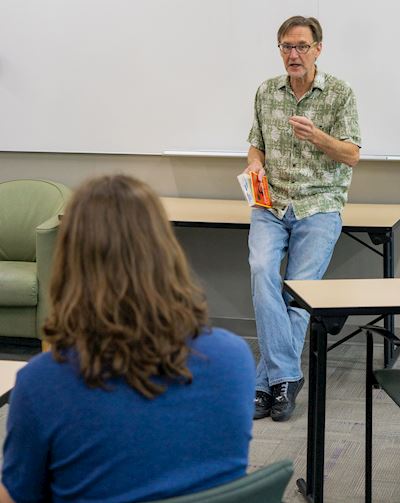MISSION
The WSU Honors Program is home to all intellectually curious and academically adventurous students, faculty, and staff. Honors provides supportive, high-quality interdisciplinary experiences for intellectual and affective development, for academic and cultural expansion. We build habits of learning that support and sustain lifelong engagements with complex questions, issues, and ideas.
LEARNING OUTCOMES
LO 1
Students will demonstrate critical thinking that is curious, open-minded, persistent, and interrogative.
LO 2
Students will analyze familiar cultural assumptions and views in context of the world’s many values, traditions, and belief systems.
LO 3
Students will adapt and apply ideas, concepts, skills, methodologies, and/or theories across disciplines.
LO 4
Students will write and communicate in clear and compelling ways.

Teaching in Honors
Thank you for your interest in teaching for the Honors Program. If you have an idea for an innovative, interdisciplinary class that centralizes class discussion, please send us your proposal. The ideal Honors course is a new design with an original topic, is taught seminar style, and demonstrates a commitment to interdisciplinary learning. You may submit your proposal here.
Why Teach in Honors?
Improve your teaching skills, especially in discussion-centered pedagogies;
Develop a new, innovative course and teach it in-load;
Work with a small group of talented students;
Support high-impact student work, including creative and critical projects suitable for presentation in public forums, such as the Honors Symposium;
Co-teach with a professor outside your department or college;
Enhance your tenure file.
TEACHING OPTIONS:
1-Credit Hour
HNRS 2830 / 2900 / 2920
If you’ve recently read a book, watched a movie, discovered a unique work of art or found an interesting piece of media that would make for a good discussion, this option might be right for you. These courses are light on homework and grading, meeting once a week for 50 minutes.
Example:
HNRS 2830: Young Adult Queer Literature & Television
This 1 credit-hour class will read a couple of the best titles in queer YA literature: Last Night at the Telegraph Club and Like a Love Story, in addition to watching queer stories on television. This class will investigate ways in which the genre has developed.
3-Credit Hour
HNRS 1100-4990
If you have a great idea for a course you’ve been wanting to teach or are interested in co-teaching or diving into a topic that doesn’t quite fit in your department, then consider teaching a 3-credit honors course. We cap our courses at 15 students, commonly feature interdisciplinary topics and favor discussion-based classes.
Example:
HNRS 2130: The Meaning of Life
Ever wondered about the meaning of life? So have countless others around the world! Explore and examine with us the various answers that Eastern philosophers, gurus, poets, movements, cultures and historians have proffered to this timeless question.
Eccles Fellowship
HNRS 3900
The Honors Eccles Fellows Program encourages faculty to work on their scholarship as they teach. Selected faculty teach one 3-credit honors class and receive 6-credit hours of compensation. The fellowship also includes a funding stipend for the class experience. Learn more here!
Example:
HNRS 3900: Poetry & Printmaking
This interdisciplinary course will investigate printmaking and poetry, two art forms with a vibrant historical and contemporary relationship. In the study of the creative exchange between these two art forms, students will write their own poems and create their own prints.
A Note on Team-Teaching...
Many Honors courses are interdisciplinary and team-taught. The goal of team-teaching is to truly integrate multiple disciplines and forms of content. It is a highly rewarding experience, but it does require considerable time and effort. Both professors must be in the class every day that the class is held and work with each other as much as they work with students. We have heard that the best approach is to meet with your co-teacher every week to discuss grading and instructional ideas.
In putting together an interdisciplinary Honors course, we suggest that you:
- Pinpoint what the course is really about, in order to ensure focus and clarity, and to keep you (and your co-teacher, if there is one) on the same page.
- Balance breadth and depth. The trick with interdisciplinary classes might be to hone in on some vital area of knowledge, something at the intersection of fields, and make this critically relevant to students.
- Locate possible intersections that emerge in themes, issues, problems, processes, topics, or activities.
- Provide students with background on the different disciplines being integrated.
- Identify outcomes. What do you want to do in the course? What are the end goals guiding your vision of student learning?

What to Expect with Honors Students
You can expect to encounter highly-engaged, enthusiastic students in Honors courses, but they come from a variety of majors across campus. Because of this, an Honors class should not be taught like upper division courses in your field. Instead, you will want to plan your teaching in a way that contextualizes course content and anticipates questions of relevance or meaning. Discipline- specific theories or language will need to be translated. The questions you field might be irreverent in the sense that they come from outside a particular disciplinary framework.
Please also remember when planning your Honors course that we are an open-enrollment program. We accept every student who wants to join. Our graduates achieve high GPAs at the end of their undergraduate experience, but they may come to us in search of challenge and inspiration. With this in mind, please consider allowing students to resubmit their work for a better grade or to drop a low score before final grades are tallied.
If a student wants to do better, let them.